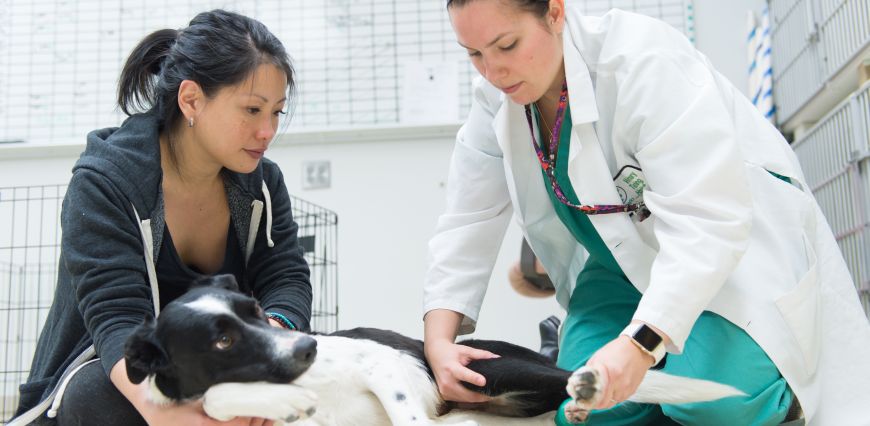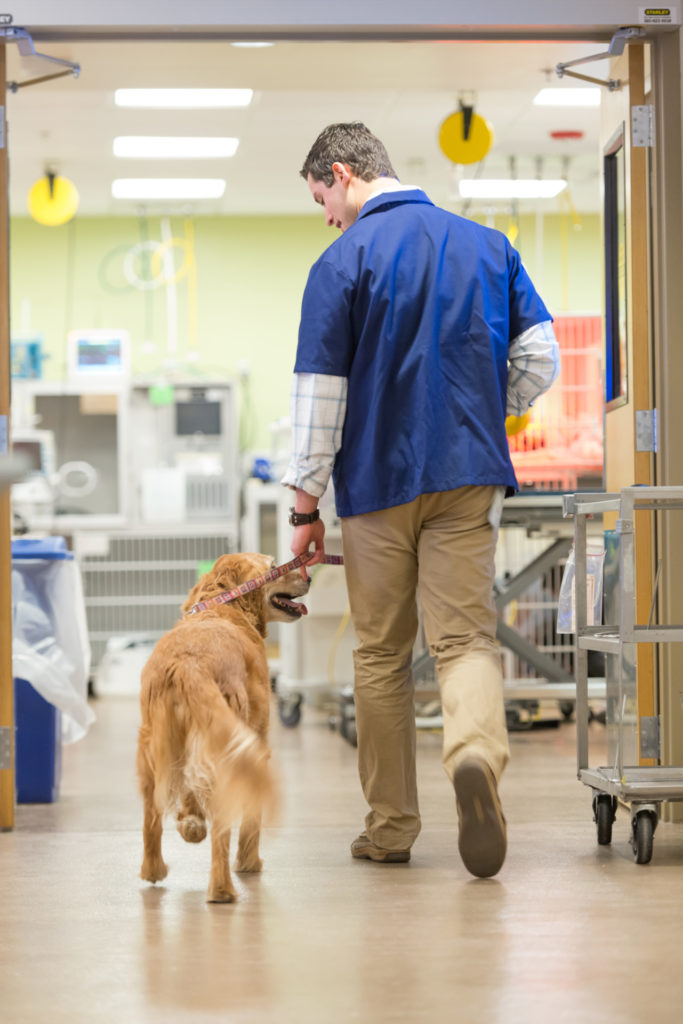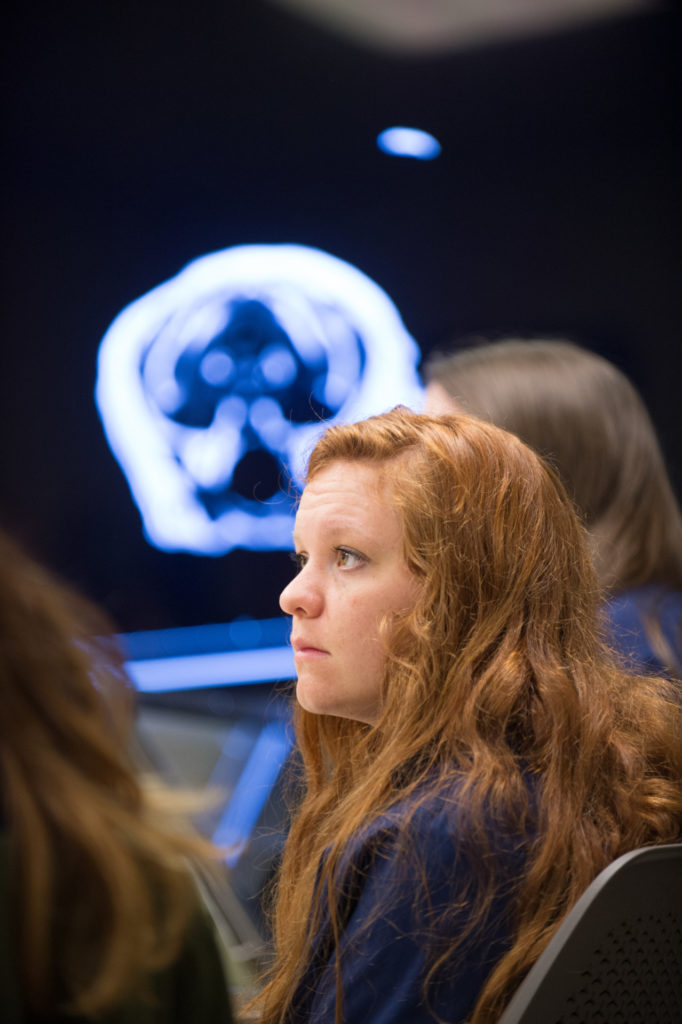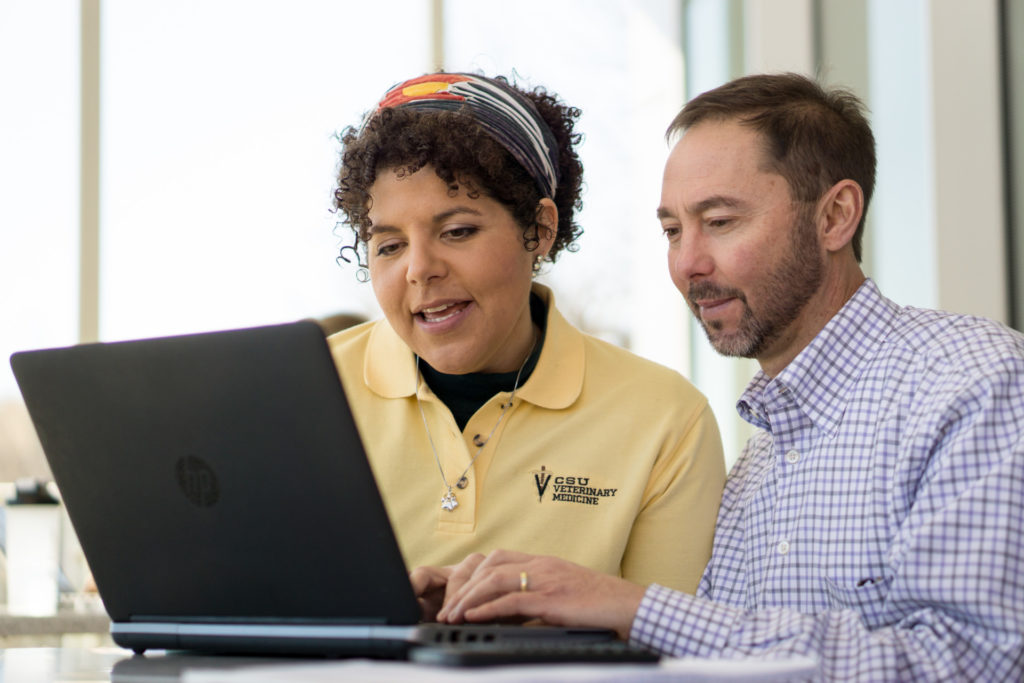
Above: Veterinarians often handle heavy workloads and high expectations. Photo by William A. Cotton/CSU Creative Services
Colorado State University in early November will host an international conference to promote personal well-being among veterinary students and professionals – people who care for animals and their owners, but at times are beset with stress, anxiety and depression.
The fourth annual AAVMC Veterinary Health and Wellness Summit is set Nov. 4-6 and is expected to draw about 250 attendees. The Association of American Veterinary Medical Colleges leads the summit; it will be hosted for the first time in Fort Collins by the CSU College of Veterinary Medicine and Biomedical Sciences.

For information and to register, visit the summit website.
Organizers hope the meeting will raise awareness about factors that may undermine veterinary productivity, career longevity and enjoyment in practice. Even more, they hope to identify best practices and concrete steps that individuals and the industry may take to improve mental health and a sense of well-being among veterinary students and professionals.
“This is one of the biggest challenges we face in the veterinary profession,” said Dr. Mark Stetter, a veterinarian and dean of the CSU College of Veterinary Medicine and Biomedical Sciences. “As a community, we realize that wellness and mental-health issues are affecting people throughout the profession, and we are talking about next steps to help address this problem in our veterinary schools and across the industry.”
In the past decade, multiple surveys have revealed the prevalence of stress, anxiety, depression and suicidal thoughts among veterinary students and professionals. Psychological distress is reported at higher rates in the veterinary community than in the U.S. adult population overall – and is more prevalent among veterinarians than among professionals in human medicine, studies have shown.
Conference leaders and organizers recognize that a healthy profession starts in professional school. They invite students, administrators, practicing veterinarians, social workers, counselors and industry partners to develop a common understanding about veterinary health and wellness – and ways well-being may be improved starting in veterinary school, Stetter said.
“We need to balance health and wellness from day one,” agreed Dr. Gretchen Delcambre, an assistant professor of biomedical sciences who instructs first-year students in the CSU Doctor of Veterinary Medicine Program.
Sophie Nelson, a CSU veterinary student, is helping plan student sessions at the summit. “We will focus on students and what is relevant in their world, to make sure that they are contributing to a community that is proactive,” she said.

Colorado State’s DVM Program has several initiatives to foster well-being, starting at orientation for first-year veterinary students, said Dr. Laurie Fonken, Ph.D., a Licensed Professional Counselor who works with CSU veterinary students. These include:
- For about a decade, the Colorado State DVM Program has employed a full-time counselor to support veterinary students and their mental health.
- The CSU program also employs a full-time Certified Financial Planner to advise veterinary students, significant in the context of wellness because college debt and personal finances are top concerns for many students.
- The CSU veterinary school was the first to regularly offer for DVM students a course called the “Healer’s Art.” Originally developed for medical students, the CSU class encourages aspiring veterinarians to strengthen the altruistic values, sense of calling and intention to serve that have led them to medicine, a process that also boosts a sense of well-being, Fonken said.
- During spring semesters, when students report higher levels of stress, the DVM Program has offered drop-in sessions called “Taming the Anxious Mind.” At the same time, veterinary students have launched a peer initiative called “21 Days of Happiness” to promote well-being.
- The DVM Program is now developing a course focused on practitioner well-being; it would be added to the CSU veterinary curriculum once approved, Fonken said.
These are examples of specific initiatives to be discussed during the summit, along with collaborations needed to set them in motion.
Dr. Andrew Mccabe, executive director of the Association of American Veterinary Medical Colleges, urged veterinarians to deal with mental health the same way they would address other problems in the populations they serve – with diagnosis, treatment and prevention.
“As a profession, veterinary medicine has a significant role to play because we value prevention. The very foundation of veterinary medicine is prevention of illness and disease,” he said. “It’s a case of ‘Doctor, heal thyself.’”
The AAVMC Veterinary Health and Wellness Summit is sponsored by Zoetis and AVMA PLIT.
Veterinarians and well-being

Why do veterinarians experience above-average levels of stress, anxiety and depression?
Starting in veterinary school, many students describe a heavy workload, pressure to excel, worries about finances and other concerns, surveys show.
In response, the student branch of the American Veterinary Medical Association created a series of videos called “It’s OK,” which highlight personal stories, encouragement and triumph over adversity.
Practicing veterinarians face unique work demands, notes Dr. Laurie Fonken, Ph.D., a Licensed Professional Counselor who works with CSU veterinary students. These include:
- Euthanasia of animal patients
- Financial limitations of animal owners, which may impact treatment decisions
- Meeting the medical needs of patients that cannot verbalize their problems
- Working closely with concerned or distressed human clients
- Wearing many hats: doctor one minute, clinic administrator the next
- Heavy workload with high expectations
Healthy habits – including mindfulness, counseling, supportive personal relationships, professional mentorship, financial planning, nutrition, exercise and time off – often help veterinary students and professionals.
As wellness has gained attention in the industry, many aspiring and practicing veterinarians feel more comfortable seeking help from family members, friends, colleagues and mental-health professionals. That’s a vital step, experts say.
Coleman Cornelius contributed to this report.